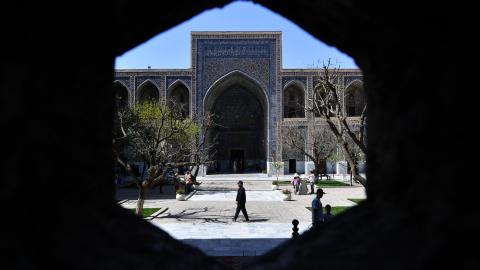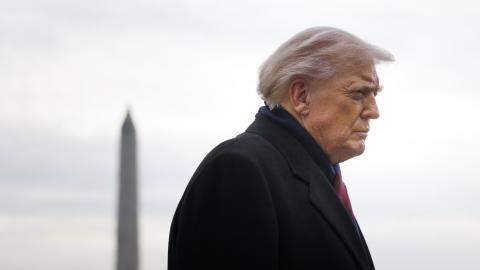In the wake of two terrorist attacks in Sinai this week, first against the tourist sector in Dahab, then against the Multi-National Peacekeeping Force, some observers have related Mubarak's situation to that of President Anwar al-Sadat in 1981. It's a useful comparison because, like Sadat at the time, Mubarak seems hapless at present. Before Sadat's assassination in October of 1981, he arrested scores of critics, intellectuals, and journalists (such as former Nasser confidante and current al Jazeera retread Mohammed Hassanein Heikal) none of whom actually wanted to kill him, as the Islamists eventually did. Thus, because he went after marginal figures rather than the most serious threat to his rule, those arrests indicated Sadat's weakness not his strength.
Similarly, every time Mubarak's security services arrests a Bedouin, the regime is telling us it is weak because it is not catching the real culprits. When they arrested over 2,000 Bedouin after the first Sinai attack in Taba in October 2004, they announced that they were floundering, and that if the regime wants to preserve its existence, Mubarak's son Gamal or military intelligence chief Omar Suleiman, or more likely both, should take the helm ASAP. The old man can't cut it any more.
It appears that the Bedouin are responsible for operational assistance, but it is extremely unlikely that they are the "big idea" men behind the Sinai bombings. The Bedouin are involved in many illegal enterprises, like smuggling weapons and drugs, but they are largely apolitical. Some Egyptians joke that the Bedu liked it better when the Israelis occupied the Sinai because they turned it into a tourist paradise and thus made the Bedouin money as the Egyptians never did, could or will. Assuming the Bedouin are helping, it is most likely because they are getting paid, and that they are angry because they feel the regime abandoned them—and that was before the security services embarked on a campaign of mass arrests and collective punishment.
So who is really behind the three large attacks on Sinai resorts since October 2004? The target itself is significant. The second attack was against Sharm al-Sheikh, Mubarak's favorite place in the world and the destination he usually chooses (over Cairo) to entertain his most important foreign visitors. Which means that it's not about Israeli tourists; it's about Mubarak himself.
The smart money is on al Qaeda, or more precisely, Qaedat al-Jihad, as some Egyptian analysts designate the bin Laden-Zawahiri organization to indicate its Egyptian origins. Zawahiri's Islamic Jihad had its greatest local success when it worked with al-Gama'a al-Islameya to kill Sadat. Of all the possible reasons for the latest attacks—bin Laden's new address, the defunding of Hamas—perhaps the most compelling link is that the Mubarak government recently released 900 middle-aged al-Gama'a al-Islameya militants, whose war against the regime ended a decade ago in a 1997 truce. Perhaps someone else is saying that the war has just begun in earnest.
Actually, it began in 1952 when Nasser cut the Muslim Brotherhood out of the regime. Which is to say that this decades-long fight is not ideological so much as it is about shares of power and who gets to rule Egypt. The rhetoric and agenda of the regime and its Islamist opponents are virtually identical; the principle difference between the two is that the latter would like a lot more sharia law in the Egyptian constitution and are willing to kill ordinary Egyptians to make that happen.
Why would Islamist extremists be striking now after Mubarak ostensibly put them down in 1997? Maybe because the far enemy, the United States, has proved more difficult to attack at home than the near enemy, Egypt. Or perhaps it is because the Mubarak regime is an aging one that, for instance, was surprised when the Muslim Brotherhood won 88 seats in the November-December parliamentary elections. It seems that Mubarak has reached the point in his career when underlings are afraid to bring him bad news and his exhausted regime's hands are already full fighting the U.S. agenda in the region. Perhaps someone, surmising that Mubarak can't manage warring on two fronts, smells blood.
The Islamists will continue to attack Egypt, which makes an overt alliance between the regime and the more moderate Muslim Brotherhood, like the one suggested in an al-Hayat column by Islamist lawyer Montasser Al-Zayat, more plausible. Among other things, that will ensure Gamal's accession, which is the regime's top priority and why it is fighting the U.S. democratization agenda. Then it will be Gamal's task to war against the extremists and leverage the Muslim Brotherhood as he pleases, variously counting on their support and then keeping them in their place, as his father did. Though it is unclear that a novice with no military credentials is a hard enough strongman to pull it off. He'll get no help from the United States since the regime already played its Islamist card in those parliamentary elections and Washington is trying to cope with the fallout of "regional transformation."

















